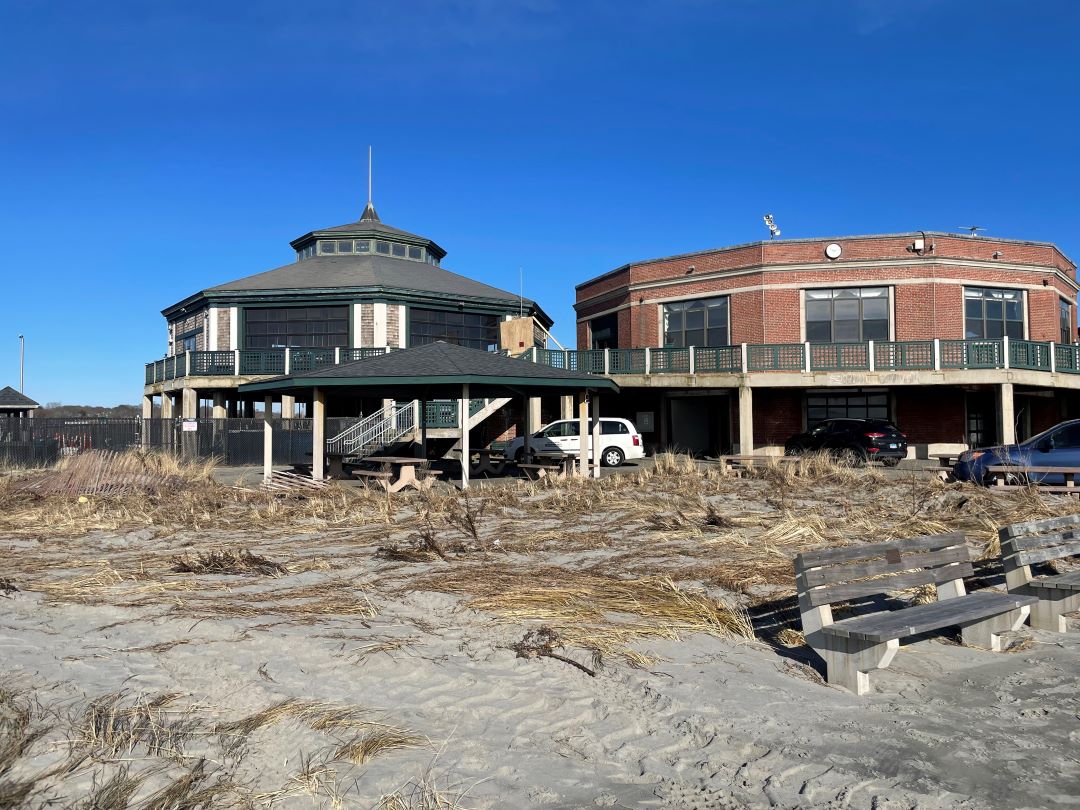Forum Showcases Forces at Play in Finding Climate Solutions
July 29, 2019
SMITHFIELD, R.I. — The complexity and frustration of managing climate change was apparent at a recent forum on adaptation and resilience.
The July 26 event, held at Fidelity Investments on Salem Street and organized by the Environmental Business Council of New England, began with a protest during keynote remarks by Sen. Sheldon Whitehouse, D-R.I. After chanting “which side are you on,” activists from Sunrise RI chided Whitehouse for failing to aggressively endorse the Green New Deal and for not signing a pledge to shun campaign donations from fossil-fuel companies. The protesters noted the hypocrisy of holding the event at the corporate campus of Fidelity Investments, which manages some $94 billion in fossil-fuel assets.
“So what we need is bold and urgent action; instead we are here at this event, we’re celebrating the incremental successes of the corporations that are profiting most from this crisis,” said Yesenia Puebla, one of the protesters.
Speaking to an audience of state and municipal policymakers and planners from across New England, Whitehouse and others at the one-day conference spoke of the complex economic and financial developments relating to climate-change adaptation and mitigation.
Whitehouse referenced the “carbon bubble,” which referred to the cost of inaction on the financial markets and economy for failing to address climate change. Whitehouse noted that the biggest banks say they support climate deals such as the Paris Agreement but they are still investing billions in fossil-fuel exploration.
Whitehouse recently co-sponsored a bill requiring publicly traded companies to disclose their investments with climate-related risks.
Jesse Keenan, a faculty member at Harvard University’s Graduate School of Design — although he noted that he wasn’t speaking on the university’s behalf — noted that the major financial and accounting companies are incorporating climate-change impacts into their investment activity.
Keenan said accounting practices are expected in the near future to value assets based on their “green” and “brown” impact as they relate to climate change. These valuations can be applied to investment measures such as credit ratings for municipal bonds that finance infrastructure projects.
Kennan also noted that not all adaptation efforts are beneficial and often have negative consequences. Too much time and money is being spent protecting places that won’t survive the damage from climate change when that effort could be better spent on at least “buying time” to develop more practical solutions, he said.
He said vulnerable cities and towns will need to do more financial risk assessment, much of it based on elevation, to carry out managed retreat from at-risk neighborhoods and the expansion of building in zones better suited for infrastructure and economic development.
You can be a good corporate citizen, Keenan said, “but you should realize that the world market economy is moving very, very quickly around you.”
Municipal planners and policymakers spoke of the political challenges of concepts such as retreat from inundations zones and innovative funding programs that pay for adaptation projects such as stormwater utility districts.
“It’s difficult to mention the word retreat,” said Jeff Caiola, assistant director of the Land and Water Resources Division at the Connecticut Department of Energy & Environmental Protection.
Others spoke of shrinking state budgets and the absence of funding sources for adaptation projects. It was noted that creative land-use strategies are needed to preserve residential and commercial property tax revenue, which is threatened by the degradation of coastal real estate.
“We have to do more with less because our tax base is going to erode,” said Kate Michaud, Warren’s town manager.
Bill Finch, who succeeded in implementing many environmental and green urban-planning programs during his tenure as mayor of Bridgeport, Conn., said cities, particularly densely built former industrial centers, have the financial and political tools to adapt to climate change.
“We all have to have responsibility. We all have to connect to our neighbors,” Finch said.
Curt Spalding, former administrator of the Environmental Protection Agency’s New England region, agreed that wealthy coastal communities are built on land vulnerable to climate change and are already showing signs of massive infrastructure headaches such as reverse-flowing drainage systems caused by higher tides.
There was little discussion of the Green New Deal and environmental justice issues associated with climate change.
On the topic of climate refugees and migration, Keenan noted that displacement is already happening, as evidenced by the relocation of residents of Puerto Rico because of hurricane Maria in 2017. Thousands, he noted, have resettled to the United States, including 50,000 to Connecticut.
A recent brief by the Brookings Institute described the millions of people displaced annually by extreme whether events and the long-term, slower migration caused by sea-level rise and desertification.
“It’s something on the order of the Dust Bowl,” Keenan said of the drought between 1930 and 1940 that prompted 3.5 million people to leave the Great Plains region of the United States.
Although many tax policies discourage economic mobility, relocation will occur from coastal areas and regions prone to forest fires and lack potable water, according to Keenan.
But the question of the source that will deliver the massive political will to tackle climate change was largely unanswered.
Finch said a national movement for climate adaptation and mitigation should be led by business philanthropists such as Bill Gates, Michael Bloomberg, and Warren Buffet.
Roger Stephenson, of the Union of Concerned Scientists, said the Apollo program that lead to the landing on the moon in 1969 should serve as a political and financial model for addressing climate change.
Todd Berman, manager of environmental programs and projects for the Connecticut utility United Illuminating, said the latest generation of civic-minded activists are an overlooked disruptive force.
“Youth is not happy with the dialogue they are seeing here,” Berman said. “It’s just not happening fast enough from their perspective.”
Categories
Join the Discussion
View CommentsRecent Comments
Leave a Reply
Your support keeps our reporters on the environmental beat.
Reader support is at the core of our nonprofit news model. Together, we can keep the environment in the headlines.
We use cookies to improve your experience and deliver personalized content. View Cookie Settings




Sounds like the conference4 was a farce, more do nothingism rather than a declaration that we shall invest no more in the dinosaurs of fossil fuel.
I must disagree with my Brother in Green… The attendees of this conference demonstrate the growing concern of the business world with the Climate Crisis. These attendees, by and large, care enough and are concerned enough to drop what they’re doing, prepare, attend, and interact at this conference. Making non-negotiable demands has a place in political tactics tool-kit, but a place only. It is not an effective strategy. How is it working out in Rhode Island green politics? Our legislature today, and Statehouse, are dominated more than ever reactionaries like Senate President, Ruggerio, and Speaker of the House, Mattiello and their trade union, construction industry and real estate industry supporters. Bottom line: We ‘greens’ cannot elect environmentally responsible reps and senators at the local level to combat this reactionary coalition. Doing that will require a strategy of coalition politics and coalition tactics. The victory over the Invenergy plant proves that such coalition environmental politics can succeed.